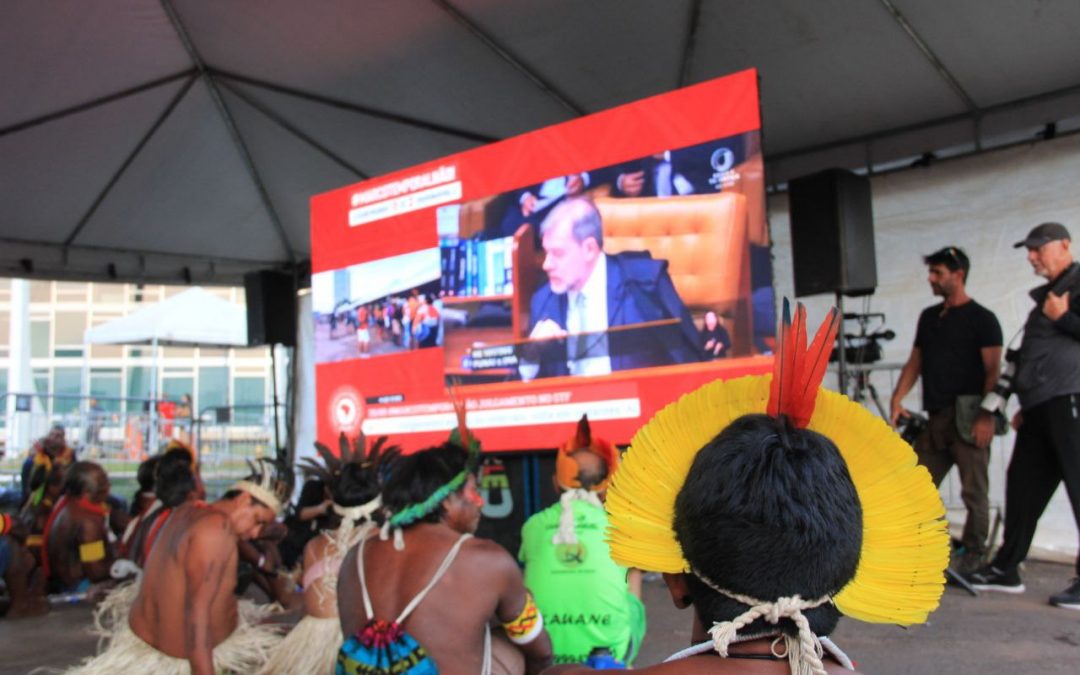
22/Sep/2023
Photo: @richard_wera_mirim
With a score of 9×2 against the anti-indigenous thesis, the Articulation of Indigenous Peoples of Brazil (Apib) celebrates the results but warns about two proposals presented in the trial that still need to be discussed: compensation for land occupation and mining in Indigenous lands.
In a historic session this Thursday (09/21), Justices Luiz Fux, Cármen Lúcia, Gilmar Mendes, and Rosa Weber of the Supreme Federal Court (STF) voted against the temporal framework and formed a majority of votes to overturn the thesis in the judiciary. With a score of 9×2, the Justices’ votes concluded by overturning the Time Frame thesis. However, the trial is set to resume on the 27th to discuss two proposals raised by Moraes and Toffoli regarding prior compensation for invaders of Indigenous Territories and the utilization of resources within Indigenous Territories, which concerns the indigenous movement. The Senate vote, advocated by the ruralist caucus to begin on September 20, has also been postponed to September 27.
“We have indeed emerged victorious from the Time Frame thesis, but there is still much to be done to ward off all the threats that are also pending in the Senate, through the law proposal 2903. We remain mobilized, we continue to fight because we need to ensure and protect the rights of Indigenous Peoples,” said Dinamam Tuxá, executive coordinator of Apib, after the conclusion of the voting session at the Brazilian Supreme Court on September 21 in Brasília.
We continue mobilised to ensure that no rights are negotiated!
The Apib celebrates the victory on the Time Frame vote that recognises indigenous rights but warns that the mobilization continues because various indigenous lands are being invaded. “It is a victory for indigenous peoples because for years we have been fighting to reject this thesis that, in a way, was paralyzing the demarcation processes in Brazil. However, there are some important points to be noted because the votes of Toffoli and Moraes brought quite dangerous elements for Indigenous Peoples,” warns Tuxá. Even in a scenario with increasing violence caused by the illegal occupation of Indigenous territory, Minister Moraes raised the possibility of compensation for invaders who supposedly hold titles to rural property in “good faith,” and Toffoli defended the possibility of natural resources exploitation (water, organic, and mineral resources) located within Indigenous Lands.
The ministers voting against the Time Frame thesis were: Edson Fachin, Alexandre de Moraes, Cristiano Zanin, Luís Roberto Barroso, Dias Toffoli, Luiz Fux, Cármen Lúcia, Gilmar Mendes, and Rosa Weber. André Mendonça and Nunes Marques voted in favor of the thesis.
The Time Frame is a political thesis asserting that indigenous peoples would only have rights to their territories if they were in possession of them on October 5, 1988, the date of the promulgation of the Federal Constitution. Apib argues that the thesis is unconstitutional and anti-indigenous because it violates the original right of peoples to ancestral territory, as provided for in the Constitution itself, and ignores the violence and persecution, especially during the Brazilian military dictatorship, preventing many peoples from being on their lands on the 1988 date.
In the Supreme Court, the Time Frame refers to a possessory action (Extraordinary Appeal No. 1,017,365) involving the Xokleng Ibirama Laklaño Indigenous Land of the Xokleng, Kaingang, and Guarani peoples and the state of Santa Catarina. With the status of general repercussion, the decision in this case will serve as a guideline for all Indigenous land demarcation processes in the country. As Minister Luís Roberto Barroso stated, “the (Brazilian) Constitution is very clear, there is no ownership of land traditionally belonging to Indigenous communities. This is the solution to this case.”
Even though the result of the vote is a victory for the Indigenous Peoples of Brazil, other proposals raised by the ministers in their votes threaten the current scenario of the fight for our rights.
Minister Alexandre de Moraes voted against the Time Frame in the Supreme Court session held on June 7, 2023. Despite his opposition to the thesis, he raised a highly threatening proposal for Indigenous Peoples. Moraes assumed the existence of rural landowners in “good faith” who could receive compensation from the State if they were to be expropriated from the illegally occupied lands for the demarcation as a indigenous land.
Apib considers that, despite the existence of a little portion of small landowners who acquired titles to Indigenous lands in “good faith” due to the illegality committed by the State, the compensation proposal assumes a reward for illegal invaders who represent the majority of properties with overlaps on Indigenous lands, thus incentivizing illegal land occupation paid with public funds. Based on the cross-referencing of land data from the National Institute for Colonization and Agrarian Reform (Incra) and the data from the “The Invaders” (Os Invasores) reports conducted by De Olho nos Ruralistas, there are 1,692 farm overlaps on Indigenous lands, totaling 1.18 million hectares, and out of this total, 95.5% are in territories pending demarcation. With his proposal, Moraes ignores the extensive history of land grabbing in Brazil and the criminal actions of ruralists, which have led to increased violence against Indigenous peoples and deforestation. Between 2008 and 2021, 46,900 hectares were deforested in areas of farm overlaps on Indigenous lands, according to the data from the aforementioned report.
On the other hand, Minister Dias Toffoli voted on September 20, representing the 5th vote against the Time Frame thesis. However, Toffoli chose to expand the topics with a theme unrelated to the one discussed in the case and included the possibility of exploiting water, organic, and mineral resources from Indigenous Lands, arguing that the issue suffers from a supposed legal omission and hinders the country’s economic development. Maurício Terena, legal coordinator of Apib, adds: “At the last moment, he (Toffoli) brought up an issue that concerns us greatly as an indigenous movement. He sets out theses on economic exploitation in indigenous lands. We understand that this is not the time for this debate, and the way he did it, to some extent, undermines the exclusive use of indigenous peoples.”
Read the full statement issued by Apib’s Legal Advisory on Justice Dias Toffoli’s vote.
Who Benefits from the Time Frame thesis?
Among the threats, we highlight the illegal occupation of some Indigenous lands by certain farmers who are directly linked to the rural political power. Brazilian politicians, both in the National Congress and the executive branch, own 96,000 hectares of land overlapping Indigenous Lands. Furthermore, many of them were funded by farmers invading Indigenous lands, who donated R$ 3.6 million to the electoral campaign of ruralists. This group of invaders financed 29 political campaigns in 2022, totaling R$ 5,313,843.44. Out of this total, R$ 1,163,385.00 was directed to the defeated candidate, Jair Bolsonaro (PL).
Senate Vote Delayed
Under pressure from the ruralist caucus, the Senate Judiciary Committee had planned to begin debating the Law Project (PL) 2903 on September 20th, which aims to turn the Time Frame thesis into law and legalize crimes committed against Indigenous peoples. However, a lack of dialogue marked that day: Indigenous leaders were prevented from entering, and the Committee rejected a request for a public hearing. The vote was postponed to September 27th after a collective request for further examination by the senators. “The rights of Indigenous peoples are being violated, and we are not being heard. Parliament is not listening to public opinion, which only benefits the interests of agribusiness,” warns Tuxá. For the Apib, the clash between the legislative and judicial branches is an affront by politicians who want to impose their economic interests on Indigenous lands at the expense of Indigenous lives.
About Apib
The Articulation of Indigenous Peoples of Brazil (Apib) is a national reference body of the indigenous movement in Brazil, created from the bottom up. It brings together seven regional Indigenous organizations (Apoinme, ArpinSudeste, ArpinSul, Aty Guasu, Terena Council, Coaib, and Guarani Yvyrupa Commission) and was born with the purpose of strengthening the unity of our peoples, fostering coordination among different regions and Indigenous organizations in the country, as well as mobilizing Indigenous peoples and organizations against threats and violations of Indigenous rights.
For more information and to schedule interviews, you can contact the Apib press service:
[email protected]
Communication management – Samela Sateré Mawé – +55 (92) 98285 5077
International communication service – +55 (65) 99686 6289 / +55 (21) 96665 5518 / +55 (92) 99430-3762
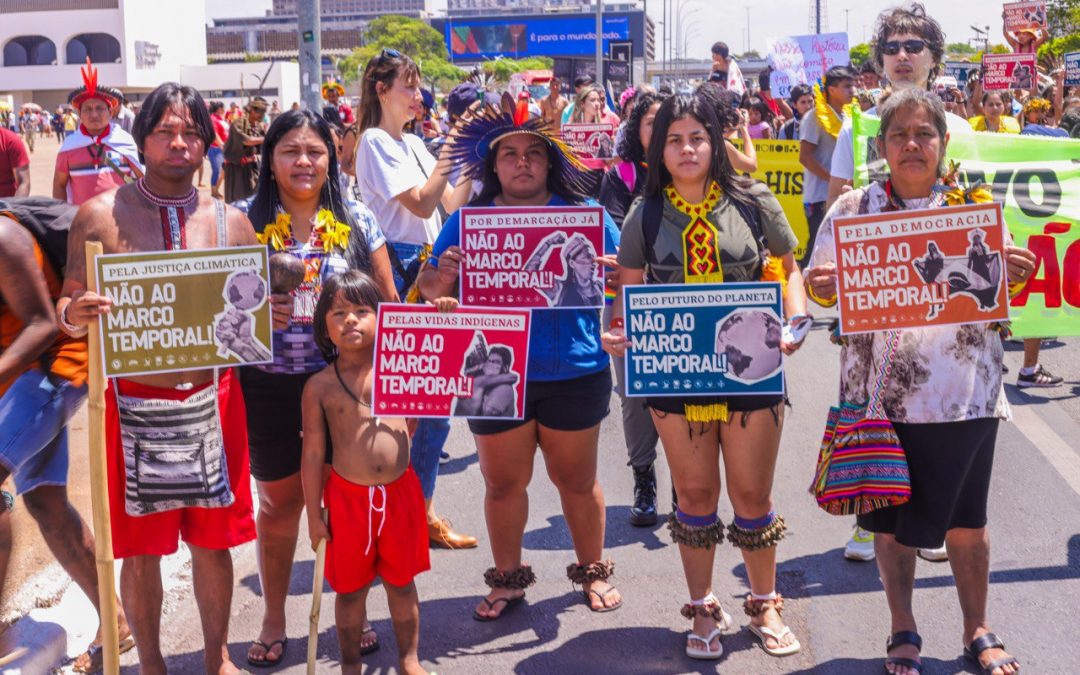
21/Sep/2023
Foto: Kamikia Kisedje / Apib
Minister from the Federal Supreme Court (STF) Dias Toffoli voted against the Time Frame thesis on the demarcation process of Indigenous Lands in a session held this afternoon (20/09). The vote now stands at five votes against the ruralist thesis and two votes in favor of the anti-indigenous proposal. The trial was interrupted due to lack of time and should resume tomorrow, September 21.
“Minister Toffoli’s vote is against the Time Frame thesis (Marco Temporal), but it contains dangerous points against indigenous peoples. We have to remain vigilant and continue mobilizing. It’s important to remember that the Supreme Court has not yet concluded its trial and the votes are still in dispute. Let’s hope that the next votes follow the rapporteur’s vote [Edson Fachin], which is what we are defending. A vote against the Time Frame, but also against prior compensation and that guarantees the original rights of indigenous peoples,” said Dinamam Tuxá, executive coordinator of Apib, after the session ended.
Maurício Terena, Apib’s legal coordinator, added: “At the last moment, the minister brought up an issue that really concerns us as an indigenous movement. The minister precepts a thesis on economic exploitation on indigenous lands. We understand that this is not the time to have this debate and the way he did it, to some extent, makes the exclusive usufruct of indigenous peoples more flexible.
The trial on the Time Frame thesis had already been suspended on August 31st. Since then, indigenous leaders from different peoples and territories have been mobilizing in Brasilia, where they are camped at the Indigenous Peoples Memorial.
So far, Ministers Edson Fachin, Alexandre de Moraes, Cristiano Zanin, Luís Roberto Barroso and Dias Toffoli have voted against the Time Frame thesis. André Mendonça and Nunes Marques voted in favor of the atin-indigenous thesis. Minister Cármen Lúcia, Rosa Weber, Luiz Fux and Gilmar Mendes have yet to vote.
The Time Frame thesis is a political thesis that states that indigenous peoples would only have the land right recognition (demarcation of lands) if they were in possession of them on October 5, 1988, the date of the promulgation of the Federal Constitution. Apib points out that the thesis is unconstitutional and anti-indigenous, as it violates the peoples’ original right to their ancestral territory – provided for in the Constitution itself – and ignores the violence, especially during the military dictatorship, and the state control to which the peoples were subjected until 1988.
At the STF, the Time Frame thesis deals, on the merits, with a possessory action (Extraordinary Appeal No. 1.017.365) involving the Xokleng Ibirama Laklaño Indigenous Land, of the Xokleng, Kaingang and Guarani people, and the state of Santa Catarina. With a status of general repercussion, the decision taken in this case will serve as a guideline for all indigenous land demarcation processes in the country. As Minister Luís Roberto Barroso said, “The constitution is very clear, there is no ownership over lands traditionally belonging to indigenous communities. This is the solution to this case.”
Senate adjourned
A lack of dialog and respect marked the session of the Senate at the Constitution and Justice Committee today (20/09). Indigenous leaders were prevented from entering and the committee rejected a request for a public hearing to debate Bill 2903, which aims to turn the Time Frame thesis into law and legalize crimes committed against indigenous peoples. The vote was postponed until September 27 after the senators collectively asked for a review.
For Apib, the clash between the legislature and the judiciary is a direct confron by politicians who want to impose their economic interests on indigenous lands over indigenous lives and those of the Brazilian people.
About Apib
A Articulação dos Povos Indígenas do Brasil (Apib) é uma instância de referência nacional do movimento indígena no Brasil, criada de baixo pra cima. Ela aglutina sete organizações regionais indígenas (Apoinme, ArpinSudeste, ArpinSul, Aty Guasu, Conselho Terena, Coaib e Comissão Guarani Yvyrupa) e nasceu com o propósito de fortalecer a união de nossos povos, a articulação entre as diferentes regiões e organizações indígenas do país, além de mobilizar os povos e organizações indígenas contra as ameaças e agressões aos direitos indígenas
The Articulation of Indigenous Peoples of Brazil (Apib) is a national coalition reference for the indigenous movement in Brazil, created from the bottom up. It brings together all seven regional indigenous organizations (Apoinme, ArpinSudeste, ArpinSul, Aty Guasu, Terena Council, Coaib and Guarani Yvyrupa Commission) and was born with the aim of strengthening the unity of our peoples, the joint action between the different regions and indigenous organizations in the country, as well as mobilizing indigenous peoples and organizations against threats and attacks on indigenous rights.
Find out more about the time frame: https://apiboficial.org/marco-temporal/?lang=en
For more information and to arrange interviews, please contact the press service:
E-mail: [email protected]
Communications Coordinator – Samela Sateré Mawé – +55 (92) 98285 5077
+55 (65) 99686 6289 / +55 (21) 96665 5518 / +55 (92) 99430-3762
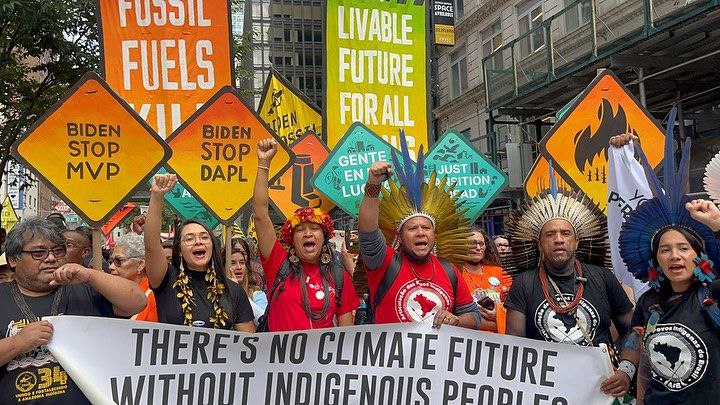
18/Sep/2023
Foto Tukumã Pataxó | Apib
The trial for the Time Frame Thesis scheduled for September 20th in the Supreme Federal Court could determine the future of Indigenous Lands in Brazilian territory and mark a turning point for the global climate. The Indigenous movement is mobilizing throughout Brazil and is sending an Indigenous commission from Apib to New York for the Climate Week. The goal is to strengthen international mobilization in defense of the right to Indigenous Lands.
- The threat to Indigenous Lands is a climate threat to all of humanity.
We are of the Earth, and the Earth is within us. If the Earth dies, we -as Indigenous peoples- die.
The Articulation of Indigenous Peoples of Brazil (Apib) is calling for various mobilizations across Brazil this week and is participating in the New York Climate Week to raise awareness about the risks posed by the upcoming vote on the Time Frame Thesis (Marco Temporal), which is scheduled on September 20th. The Supreme Court of Brazil will vote on the legitimacy of a legal thesis promoted by the Brazilian agribusiness sector, which proposes to review the demarcation process of Indigenous lands, and this could directly impact the global climate crisis.
The Time Frame Thesis proposes that only Indigenous peoples who can prove they were living on their lands in 1988, the same year the Federal Constitution was promulgated, can have rights to those lands. This denies the forced evictions of hundreds of communities that could only begin to claim their ancestral lands after Brazil’s redemocratization in the late 1980s.
This week marks the 15th edition of Climate Week in New York, from September 17th to 24th, and the 78th Session of the United Nations General Assembly, from September 19th to 23rd, which will open with the speech by President Lula. In light of these events, a group of 10 Indigenous leaders is in New York to participate in activities during Climate Week. The goal is to internationally alert about the threat that the Time Frame Thesis represents to the lives of Brazil’s Indigenous peoples and to the global climate crisis, as Indigenous Lands serve as a life reserve for the entire planet.
Apib and its regional organizations are strengthening mobilizations in Indigenous territories, cities, and especially in the capital, Brasilia, against the approval of the Marco Temporal thesis, which will be voted on September 20th. The proposal is to closely follow the trial and strengthen the next steps in the Indigenous movement’s struggle. Apib organized over 220 demonstrations in 21 states, including the Federal District, in May and June.
There are still five Supreme Federal Court justices left to vote in the trial. So far, there are four votes against the Time Frame Thesis and two in favor. Justices Edson Fachin, Alexandre de Moraes, Cristiano Zanin, and Luís Roberto Barroso have expressed opposition to the ruralist thesis. The only votes in favor of the anti-Indigenous proposal come from justices appointed by former President Jair Bolsonaro, André Mendonça and Nunes Marques.
On the same day as the Supreme Court vote, the Brazilian Senate is attempting to include in its agenda the project to turn the Time Frame Thesis into law. Ruralist senators seek to create a conflict and confrontation with the Brazilian judiciary in case the Supreme Court annuls the Time Frame Thesis.
In addition to the Time Frame Thesis, another proposal (PL 2903) is currently under consideration, which proposes further setbacks in the rights of Indigenous peoples, such as the construction of roads and hydroelectric plants in Indigenous territories without free, prior, and informed consent of the affected communities. The proposal also aims to allow farmers to sign production contracts with Indigenous people, violating the rights of Indigenous peoples to the exclusive use of demarcated lands.
While some falsely claim that “there is plenty of land for few Indigenous people in Brazil,” Apib argues the opposite, stating that there is plenty of land for few large landowners, and that agribusiness promotes the illegal invasion of Indigenous lands. The organization asserts, “there is no solution to the climate crisis without guaranteeing the rights of Indigenous peoples and the demarcation of their territories.”
Currently, nearly half of Brazil’s land is in the hands of rural producers. According to data published in Brazilian Diario Oficial da União, 41% of the total land in the country is rural properties, 13.7% is Indigenous lands, and 45.2% is designated for other purposes. Indigenous Lands represent a guarantee of life for Indigenous peoples and for all of humanity that depends on the future climate.
The Time Frame Thesis is a modern colonization strategy. “The future of Brazil’s Indigenous peoples is in grave danger, which can affect all of humanity, as it has been shown that Indigenous peoples, thanks to our ways of life, are guardians of nature and, therefore, of the global climate balance,” says Apib’s executive coordinator, Dinamam Tuxá. While 29% of the surrounding territory of Indigenous Lands is deforested, the deforestation rate within Indigenous Territories is only 2%, according to data collected in September 2022 by Apib and the Amazon Environmental Research Institute (IPAM). According to this study, most of the degradation is the result of illegal actions funded by agribusiness sectors, such as soybean plantations and extensive livestock farming. Similarly, scientists emphasize the importance of Indigenous Territories, where biodiversity is considerably higher than in the rest of the national territory.
Currently, the Supreme Federal Court is adjudicating a proposal that seeks to change the demarcation process of Indigenous Territories in Brazil through the Time Frame Thesis. At the same time, the National Congress is trying to turn the Time Frame Thesis into law and legalize crimes that promote Indigenous genocide and environmental destruction. But who is financing this threatening scenario? National and foreign companies such as Bunge, Xp, Kinea, Bradesco, Ducoco, Groupe Lactalis, among others, as well as international banks and investment funds, contribute to Brazilian agribusiness, which would be the main beneficiary if the Marco Temporal were approved, as recent reports from De Olho nos Ruralistas show.
A few farmers and entrepreneurs benefit from the profit of agribusiness at the expense of the lives of Indigenous peoples and the global climate balance. Illegal land invasions, assassinations of leaders and activists, and violence resulting from land disputes have increased in recent years. Allowing the occupation of Indigenous lands for the enrichment of a few is a modern form of colonization in which settlers seek to take over more and more hectares of national territory.
The Time Frame proposal exists as a consequence of the economic and political power of agribusiness. If approved, crimes will increase, and agricultural and natural resource extraction will intensify. The first to pay this bill will be Indigenous peoples. “Those responsible for continuing Indigenous genocide and worsening the climate crisis will be marked in history. Many will be accomplices of the new colonialism that threatens the survival of us, Indigenous peoples who inhabit the vast territory called Brazil, and the future of all humanity, because there is no solution to the climate crisis without the participation of Indigenous peoples,” emphasizes Dinamam Tuxá.
Relevant activities of Apib during the 15th edition of Climate Week from September 17th to 24th:
Apib participated on September 17th in the Climate Week March on the streets of New York in support of the Fight Fossil Fuel Strike. The indigenous delegation of Apib denounced the threat posed by the Time Frame Thesis, and they emphasized the indigenous emergency situation regarding extractive industries and agribusiness that cause multiple instances of violence in our territories. In addition, among the activities that make up the Climate Week agenda, it is worth noting that the executive coordinators Kleber Karipuna, Dinamam Tuxá, and other members of the indigenous delegation will participate on Tuesday 19th, in the talk “FCLP: Rights, Participation and Benefits for Indigenous Peoples and Local Communities in Forest Climate Financing” organized by the Forest and Climate Leaders Partnership organizations. On September 22nd, a portion of the delegation will be present at the dialogue co-organized with H.E. Razan Al Mubarak, the current president of the International Union for Conservation of Nature, to assess progress in the COP28 agenda with the aim of collectively identifying meaningful and respectful ways of involving Indigenous Peoples in the COP.
- Please see photos and videos of the March and other events on the Climate Week agenda where the Apib delegation was present:
Apib Audiovisual Material – 15th edition of Climate Week in New York
About Apib
The Articulation of Indigenous Peoples of Brazil (Apib) is a national reference body of the indigenous movement in Brazil, created from the bottom up. It brings together seven regional indigenous organizations (Apoinme, ArpinSudeste, ArpinSul, Aty Guasu, Terena Council, Coaib, and Guarani Yvyrupa Commission) and was born with the purpose of strengthening the unity of our peoples, fostering coordination among different regions and indigenous organizations in the country, as well as mobilizing indigenous peoples and organizations against threats and violations of indigenous rights.
Learn more about the Time Frame Thesis:
https://Apiboficial.org/marco-temporal/
For more information and to schedule interviews, you can contact the Apib press service:
[email protected]
Communication management – Samela Sateré Mawé – +55 (92) 98285 5077
International communication service – +55 (65) 99686 6289 / +55 (21) 96665 5518 / +55 (92) 99430-3762
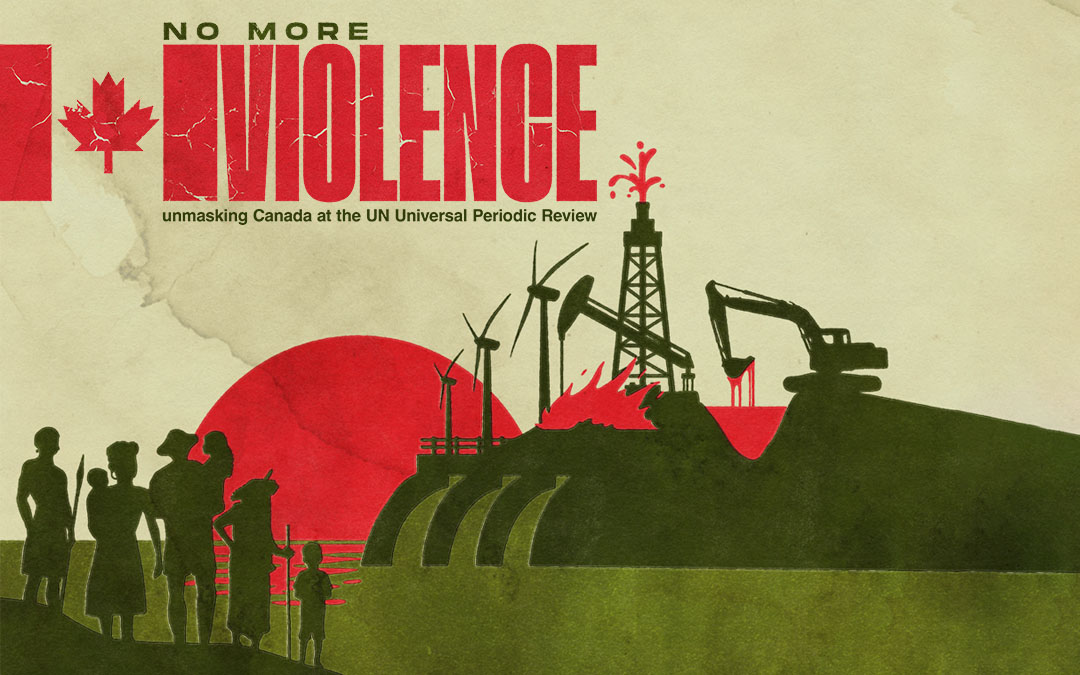
31/Aug/2023
Geneva, August 31, 2023 – A groundbreaking report titled “Unmasking Canada: Rights Violations Across Latin America” was unveiled at the United Nations Universal Periodic Review Process (UPR) pre-session in Geneva, spanning from August 28 to September 1, 2023. This in-depth investigation highlights extensive human rights and environmental breaches by Canadian companies in Latin America and the Caribbean.
Compiled through the collaboration of over 50 civil society organizations, the report implicates 37 Canadian projects across nine countries in the region. Of these, 32 projects have been found responsible for environmental rights infringements, including 105 oil spills in Peru’s Block 192, directly linked to Frontera Energy. Additionally, the right to Free, Prior, and Informed Consent was violated in 26 projects, exemplified by dubious practices in Ecuador’s Warintza project managed by Solaris Resources Inc. Violent confrontations tied to 16 projects are also highlighted, with a notable incident in Peru in July 2023, where 20 individuals were injured.
While Canada positions itself as “climate forward,” this report challenges such a portrayal, emphasizing Canada’s protection of extractive industries that are responsible for significant human rights and environmental harm. In response to these findings and anticipating Canada’s UPR on November 10, 2023, the report advocates for UN member states to impose legally binding resolutions on Canada, compelling the nation to address corporate misconduct overseas.
Mauricio Terena, Legal Coordinator from Brazil’s Association of Indigenous People (APIB), said: “We have come here to denounce the involvement of Canadian companies in human rights violations in Brazil, particularly the case of the Belo Sun mining company in Pará, which aims to establish the country’s largest open-pit gold mine. While Canada portrays itself as a defender of human rights and the environment, its actions contradict this narrative, especially when infringing upon the rights of indigenous peoples in Brazil. The discrepancy becomes evident when we realize that Canada has not signed the ILO’s Convention 169. Therefore, we hope that the states with which we are in dialogue recognize this reality and urge Canada to reassess the operations of its corporations, seeking tangible action in defense of indigenous peoples and traditional communities”
Addressing the UPR’s function, where every four years UN member states review each other’s human rights records, Latin American civil society representatives presented new recommendations for Canada. These recommendations underscore the need for Canada to introduce binding and comprehensive legislation centered on due diligence and corporate accountability. This encompasses the oversight of financial institutions and Canadian corporations throughout their global supply chains, aiming to prevent, mitigate, and penalize corporate misdeeds while ensuring victims of such practices overseas can seek justice and full reparation.
“We hope that the UPR (Universal Periodic Review) process will establish itself as another strategy in our defense of indigenous peoples’ rights, serving as a tool for the protection of human, indigenous, and environmental rights. It is essential to acknowledge that corporations involved in such violations are committing criminal acts. These actions should not be viewed merely as isolated incidents, but rather on a broader scale, as violating indigenous rights impacts all of humanity. Thus, beyond national and international laws, these transgressions should be seen from a more comprehensive perspective. It is crucial for states to commit, within the UN framework, to join a global mechanism where they recognize the need to monitor and mutually hold each other accountable for actions that uphold human, indigenous, and environmental rights”, said Maria Judite “Kari” Guajajara, Legal Advisor at the National Indigenous Organization of the Brazilian Amazon (COIAB).
This isn’t the first instance of Canada facing allegations within the United Nations Universal System due to the activities of its corporations abroad. Six recommendations were directed at Canada during the 3rd cycle of the Periodic Review. These addressed, among other concerns, Canadian businesses’ vital assurance and protection of human rights. Nevertheless, even after pledging to meet these recommendations, Canada consistently failed to fulfill its extraterritorial obligations, neglecting to take effective action to supervise corporate activities domestically and internationally.
Gisela Hurtado, Advocacy Manager at Amazon Watch, commented: “Our report unveils the disturbing reality behind Canada’s corporate endeavors in Latin America. While Canada boasts of ethical business conduct, the documented evidence reveals a starkly contrasting picture – one where profit is prioritized over people and the environment. Urgent change is paramount.”
The report’s presentation in Geneva was spearheaded by a delegation that included Mauricio Terena from APIB; Maria Judite “Kari” Guajajara from COIAB; Josefa de Oliveira, a Popular Educator with Movimento Xingu Vivo Para Sempre; Lorena Aranha Curuaia, Vice President of the Iawá Community; ; and Brayan Mojanajinsoy Pasos, General Secretary of the Association of Indigenous Councils of the Municipality of Villagarzón Putumayo (ACIMVIP). The delegation was further supported by representatives from organizations including Amazon Watch, AIDA (Regional), Earthworks (US) Gaia (Colombia), and Ambiente y Sociedad (Colombia).
Executive Summary
Informe Regional
Informe Amazônico
Informe sobre Petróleo
UPR Canada Advocacy Paper
Short summary involving Canadian companies involved in rights violations highlighted in the report.
1. Frontera Energy in Lote 192 in Peru:
– Over 2,000 sites contaminated, affecting 26 Amazonian indigenous communities.
– Proposed activity closure plan doesn’t include reparations for affected communities.
2. Mineradora Argentina Gold SRL (joint venture between Barrick Gold and Shandong Gold):
– Responsible for at least five toxic substance leakages, including cyanide and arsenic, into the Jáchal River in Argentina from the Veladero mine.
– The project is in violation of the Glacier Law due to its location in a glacial zone and affects the UNESCO recognized biodiversity heritage site, the San Guilhermo Reserve.
3. Belo Sun’s Volta Grande project in Brazil:
– Cumulative impacts with the Belo Monte hydroelectric dam, located less than 10 km away from the prospected mining site;
– Armed security forces hired by the Canadian mining company to monitor local leaders and hindering their freedom of movement;
– Utter disrespect to Free, Prior and Informed Consent of Indigenous and riverine communities;
– Imminent and irreversible risks of an environmental tragedy if toxic waste spills into the Xingu River due to a potential dam break, given the lack of sysmic and tailings dam safety studies.
– Direct impact on communities, their traditional livelihoods, and local ecosystems.
4. The Mina Varadero in Chile:
– Contaminated water sources with mercury, impacting rural populations and children.
5. ISAGEN – Brookfield Asset Management’s Hidrosogamoso dam in Colombia:
– Significant harm to local ecosystems and communities.
6. American Lithium’s mining projects (Falchani, Macusani, and Quelccaya) in Peru:
– Regularly release toxic residues, affecting over 700,000 people and contaminating the Lake Titicaca and Amazon River basins.
7. Solaris Resources Inc.’s Warintza mining project in Ecuador:
– Ignored the territorial rights of the Shuar Arutam indigenous people and adopted divisive tactics.
8. Mining project of Ixtaca in Mexico:
– Suspended due to violations of indigenous rights.
9. El Pato II mining project in Guatemala:
– Affected the Poqomam Maya and mestizo communities without proper prior consultation.
10. Libero Copper’s Mocoa mining project in Colombia:
– Directly harmed the ancestral territory of the Inga people, violating their rights.
11. Cosigo Resources LTD’s Machado gold extraction project in Colombia:
– Severely impacted sacred indigenous sites in the Yaigojé Apaporis territory.
12. Barrick Gold’s Pueblo Viejo mine in the Dominican Republic:
– Forced the displacement of 65 local families due to the El Llagal waste dam.
13. Mining projects of La Plata by Atico Mining Corporation and Las Naves by Curimining S.A. (a subsidiary of Adventus Mining Corporation) and **Salazar Resources Limited in Ecuador:
– Tried legalizing their operations despite violating national and international human rights laws, leading to confrontations and injuries.
14. Petrotal’s Lote 95 in Peru:
– Protests demanding community rights resulted in several deaths by police forces guarding the oil field.
15. Equinox Gold in Brazil:
– Concealed data regarding their operations and impacts, including a dam break.
– 4,000 of people directly impacted by toxic waste resulted from the dam break that contaminated local Amazonian rivers, violating the right to a clean environment and adequate access to drinking water.
– Criminalization of local community leaders that protested for the right to water.
16. Gran Tierra Energy in Ecuador:
– Conducted explorations without proper information dissemination in the Charapa, Chanangué, and Iguana blocks.
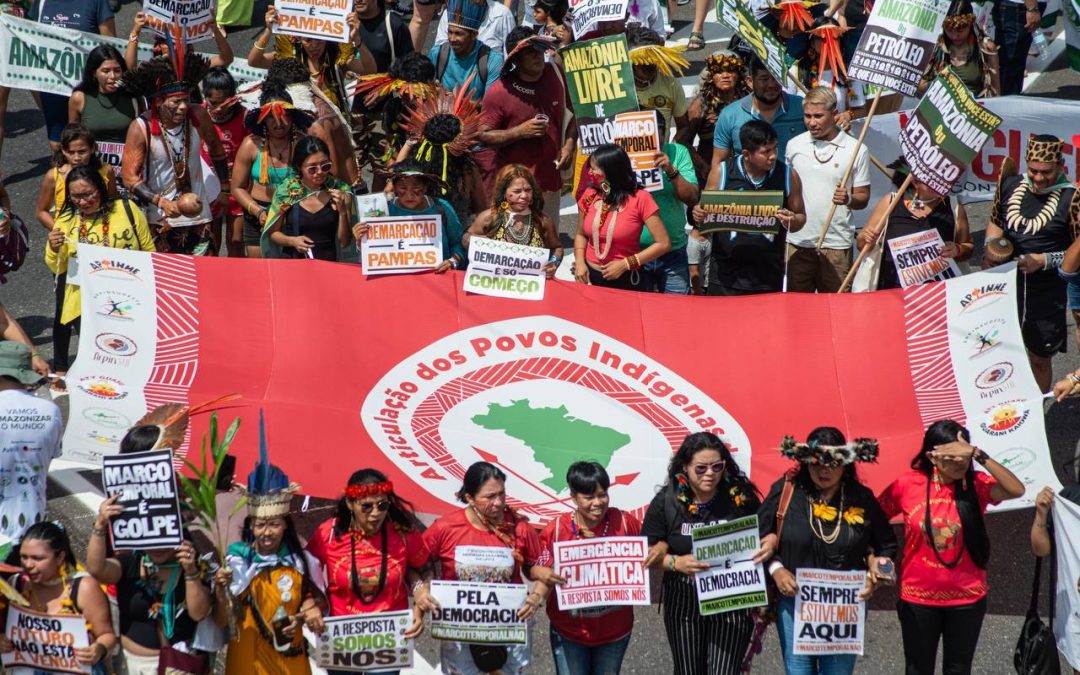
10/Aug/2023
The organization highlights the need for Amazonian countries to have defined actions involving the demarcation of indigenous lands, titling of quilombola territories and the creation of protected areas.
The eight presidents of the member states of the Amazon Cooperation Treaty Organization (ACTO) signed last Tuesday, August 8th, the Letter of Belém . The Letter is the main document of the Amazon Summit, which ends this Wednesday (09/08), in the capital of Pará. The Articulação of the Indigenous Peoples of Brazil (Apib), a national organization of reference of the indigenous movement, considers the Letter of Belém frustrating and demands concrete goals for the demarcation of indigenous lands.
“The document should be more ambitious. We understand there is a diversity of perspectives involving eight countries, and we recognize that political commitments were made, but the absence of specific and objective goals related to indigenous peoples and the environment is frustrating”, says Kleber Karipuna, executive coordinator of Apib.
Among the demands, Apib highlights the need for the Governments to define actions to address the point of no return in the Amazon (a term used by specialists to refer to the point at which the forest loses its ability to regenerate itself), which involves the demarcation of indigenous lands, titling of quilombola territories and the creation of protected areas. In addition to the monitoring and protection of territories and policies to support the sustainable use of those territories.
The indigenous movement also considers as disappointing the suspension of the announcement of demarcation of two indigenous lands during the Amazon Summit, as reported in the newspaper Folha de São Paulo . According to the report, the territories to be demarcated would be the Rio Gregório Indigenous territory, in Tarauacá (AC), and Acapuri de Cima, in Fonte Boa (AM). They are part of a list of 13 indigenous lands that are ready to be homologated , which was presented by the working group of Indigenous Peoples of the Transitional Government, of which Apib was part.
“The Government included the homologation of these 13 territories as part of the goals of the first 100 days of government. This goal was not met and, for the Summit, there was an expectation that other territories would be announced. The delay in this process has concrete Impacts on the indigenous peoples who are dealing with violence on a daily basis ”, emphasizes Dinamam Tuxá, who is also the executive coordinator of Apib.
Assembly of the Peoples of the Earth for the Amazon
Indigenous leaders from Apib and the Coordination of Indigenous Organizations of the Brazilian Amazon (Coiab) were in Belém for the Assembly of Peoples of the Earth for the Amazon , held between August 4th and 8th.
The Assembly was part of the political efforts of the indigenous movement to influence the IV Meeting of Presidents of the Signatory States of the Amazon Cooperation Treaty Organization (ACTO), Amazon Dialogues and the Amazon Summit.
During the Assembly, protection policies for isolated peoples were discussed, threats of exploitation by large mining companies and the oil industry, demarcation of ancestral territories, in addition to the resumption of the “time frame” case in the Federal Supreme Court (STF) (This would deny the claims of Indigenous communities to their territories if the communities cannot show that they were present on their lands when the 1988 Constitution was enacted).
On August 7, indigenous organizations in the Amazon published a document, “Letter from the Indigenous Peoples of the Amazon Basin to Presidents” . Delivered to the Amazonian presidents, the letter highlights the importance of dialoguing with the Indigenous movement to stop and solve the global climate crisis.
“Without us, there will be no Amazon; and, without it, the world as we know it will no longer exist. Because we are the Amazon: its land and biodiversity are our body; its rivers flow in our veins. Our ancestors not only preserved it for millennia, but also helped to cultivate it”, says an excerpt from the document.
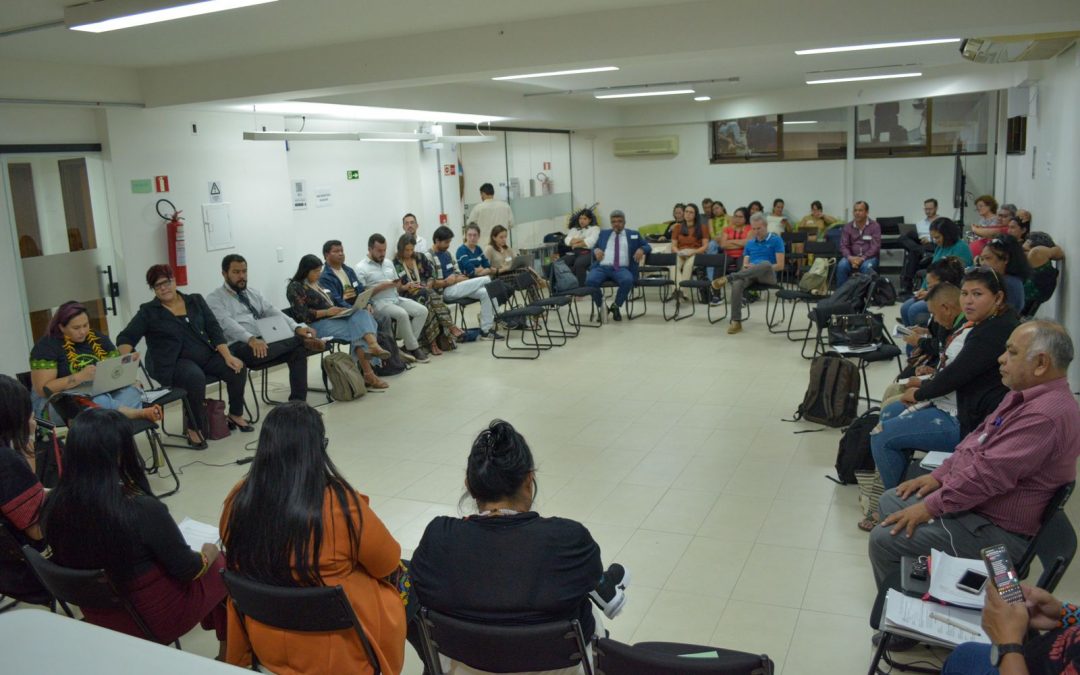
30/Jun/2023
Brasilia – DF, Brazil
June 30, 2023
1. We, Indigenous peoples and organizations and allies who met in Brasilia from June 28th to 30th, 2023, with the objective of evaluating and promoting a diagnosis of the construction process and deliberations regarding the holding of the Amazon Summit, which will take place in Belém – PA on the 8 and 9 of August 2023, after the Amazon Dialogues (4, 5 and 6 of August), and which intends to produce a consensus position regarding the forest to be presented in future global debates on climate action and the protection of biodiversity.
2. In view of the aforementioned proposal, we insist that the Indigenous peoples of the Amazon Basin, as true experts, deep connoisseurs and protectors of forests, still do not have the necessary and indispensable conditions to effectively participate in the processes of dialogue, proposition and construction of the aforementioned Summit.
3. We consider that dealing with the Amazon agenda without the effective participation of the Indigenous Peoples who inhabit it, demonstrates the non-recognition of our lives and the roles we play in favor of the maintenance and defense of the forests. Once again, we are faced with debates and construction of proposals about our territories without our guaranteed participation, which reveals the recurrent colonialist practice that seeks to silence our protagonism, while supplanting our voices and autonomy in decision-making spaces.
4. Before this scenario, we reaffirm our self-determination and demand the effective inclusion in the spaces, as well as the articulation and construction, especially for the Amazon Summit, as Indigenous peoples of the entire Amazon Basin, holders of the practices and knowledge essential to the maintenance of the climate balance and biodiversity.
5. We announce the creation of the Working Group that seeks to represent national and regional Indigenous organizations from the 09 countries that make up the Amazon Basin (Brazil, Colombia, Peru, Ecuador, Venezuela, French Guiana, Guyana, Suriname and Bolivia) with the objective of advocating from the perspectives of Indigenous Peoples, the propositions of the Amazon Summit and all subsequent processes until COP 30 in 2025.
6. We, the Indigenous peoples and organizations of the five countries that are part of the Amazon Basin present at this meeting, demand that our own forms of territorial organization and traditional and original occupation, which are independent and prior to State recognition, be considered.
7. Discussing the future of the Amazon without Indigenous peoples is equivalent to violating our original rights and all the work we do for human life on the planet.
INDIGENOUS ORGANIZATIONS THAT SIGN THIS LETTER:
Coordination of Indigenous Organizations of the Brazilian Amazon – COIAB
Articulation of the Indigenous Peoples of Brazil – APIB
Articulation of Indigenous Peoples and Organizations of the Amazon – APIAM
Roraima Indigenous Council – CIR
Coordination of Organizations and Articulations of the Indigenous Peoples of Maranhão – COAPIMA
Organization of the Indigenous Peoples of Rondônia and Northwest Mato Grosso – OPIROMA
Articulation of the Indigenous Peoples of Tocantins – ARPIT
Manxinerune Tsihi Pukte Hajene – MATPHA
Union of Indigenous Women of the Brazilian Amazon – UMIAB
Indigenous Council on Climate Change – CIMC
Confederation of Indigenous Nations and Peoples of the Eastern Cacho and Bolivian Amazon – CIDOB
Confederation of Indigenous Nationalities of the Ecuadorian Amazon – CONFENIAE
Organisatie van Inheemse Volken in Suriname – OIS
Association of Amerindian Peoples – APA
National Articulation of Indigenous Women Warriors of Ancestry (ANMIGA)
ALLY ORGANIZATIONS THAT SIGN THIS LETTER:
Avaaz
The Nature Conservancy Brazil – TNC Brazil
World Wide Fund for Nature Brazil – WWF Brazil
Amazonian Cooperation Network – RCA
Amazon Watch
Voices of Just Climate Action – VAC
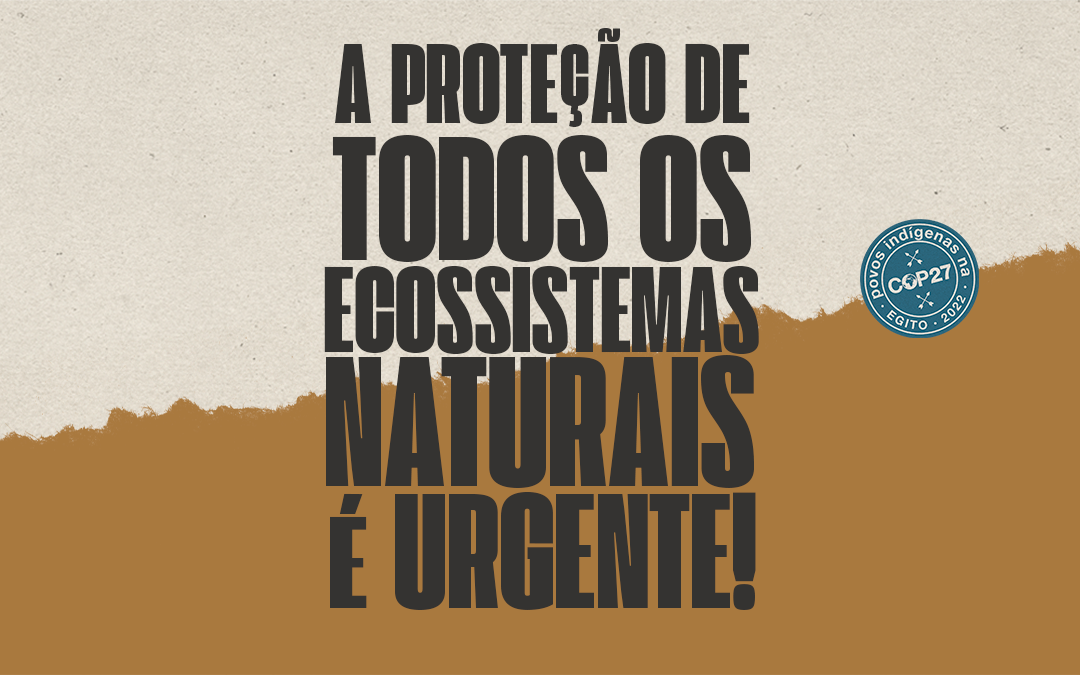
16/Nov/2022
We, from the Brazil’s Indigenous People Articulation (APIB) and the National Coordination of Articulation of Rural Black Quilombola Communities (CONAQ) emphasise our position in defence of all natural ecosystems in Brazil. It is extremely important that climate negotiations take into account not only forests, but also savannas, grasslands, wetlands and all the different expressions of nature around the world. These landscapes also contribute to the fight against climate change and are part of the solutions for a more sustainable, inclusive and socially just world.
We urge the European Union to take the necessary and urgent measures to prevent imported deforestation, as well as the land conversion of other native wooded lands. This is crucial in the Cerrado context, as most of the soy exported to the European Union is produced in this highly threatened biome.
The Cerrado is not a degraded landscape; it is the world’s richest savanna. It is home to hundreds of indigenous people, cultures and territories, as well as to communities of quilombolas, geraizeiros* and other traditional cultures and populations. It is also the largest agricultural frontier in the world, bearing the largest impact on soy imported by Europe. Monitoring tools are available to ensure the protection of the Cerrado – all we need is political will!
The same goes for all other natural ecosystems that are not forests: Pampas, Pantanal, Caatinga, as well as for the Atlantic Forest. If the European regulation against deforestation restricts itself to only protecting forests, it will have very limited impact – as almost 75% of the Cerrado would remain unprotected. The same would happen to 76% of the Pantanal and of the Pampas and almost 90% of the Caatinga. Moreover, the European regulation would have a perverse effect, as it would intensify the pressure of destruction on these ecosystems and on its people.
Ultimately, by being restricted to forests, the European regulation against deforestation would have the opposite effect of its original objective. This is why this law must also include “native other wooded lands” (primary savannas), rather than being restricted to native forests only.
This would increase the Cerrado protection from 26% to 82%, Pantanal protection from 24% to 42% and of the Caatinga from 11% to 93%. The Brazilian Cerrado is losing nearly a million hectares each year, and this destruction is increasing. An eventual revision of the law to be discussed in 2 years will not prevent the loss of millions of hectares of valuable ecosystems, the emission of millions of tons of carbon, nor violent attacks on hundreds of traditional people and territories. Therefore, we reiterate our claim:
THE EUROPEAN LEGISLATION ON DEFORESTATION MUST ENSURE THE RESPECT OF THE HUMAN RIGHTS OF ALL INDIGENOUS, QUILOMBOLA AND TRADITIONAL PEOPLE, AND PROTECT THE ENTIRE CERRADO NOW, BY INCLUDING NATIVE AND PRIMARY “OTHER WOODED LANDS” IN THE SCOPE OF THE LAW TEXT TO BE APPROVED THIS YEAR.
For technical details on this topic, refer to the following documents:
Egypt, Sharm el Sheikh, 15 November 2022
ARTICULATION OF THE INDIGENOUS PEOPLES OF BRAZIL – APIB
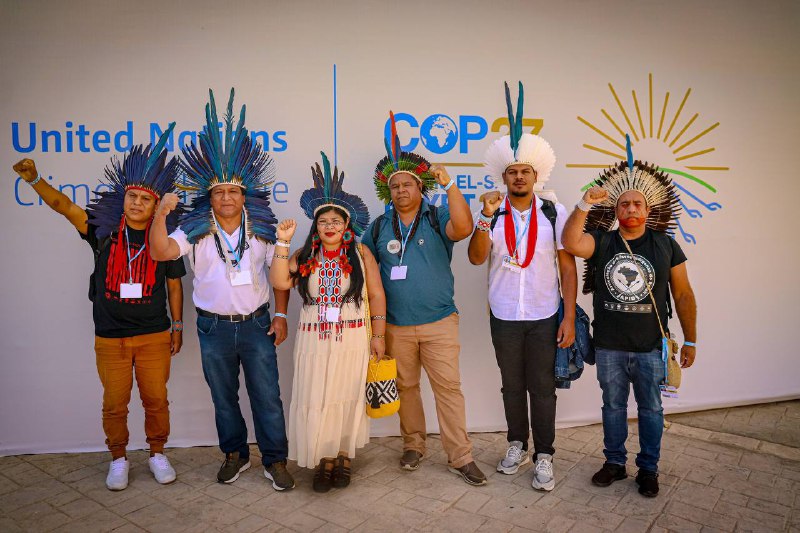
14/Nov/2022
Apib note to the new Lula Government and the world
The Articulation of the Indigenous Peoples of Brazil (Apib), together with its grassroots organisations, is present at the 27th UN Conference on Climate Change to reaffirm what needs to be done to tackle the global climate crisis: RECOGNIZE AND GUARANTEE LAND TENURE RIGHTS OF OUR INDIGENOUS LANDS!
We are in Egypt with an Indigenous delegation composed of women, men and young people who live in all 6 ecosystems in Brazil. We occupy this space because we know that for our Lands and Lives to be protected, it is still necessary to demarcate the minds of humanity. Government representatives, activists, leaders of human rights and socio-environmental organisations need to understand and support indigenous peoples in this ancestral mission of protecting our MOTHER EARTH.
For the whole world, this is the COP that marks the return of Brazil to the discussion and agendas on climate change, human and socio-environmental rights, after the last four years of a genocidal and ecocidal misgovernment. President Lula’s election victory, supported by Apib and all its organisations, marks a new moment for Brazil on the national and international scale.
Without our territories, greenhouse gas emission rates would be even more drastic. In 2021 alone, Brazil recorded the highest increase in the dumping of CO2 into the atmosphere in the last 19 years. A total of 2.42 billion tons of these pollutants were dumped.
On the international scenario, the European Parliament is in the process of approving the anti-deforestation law (FERC) and needs to ensure traceability of commodities beyond forests. Demanding that commodities producing companies respect the preservation of our biodiversity and the rights of indigenous peoples is crucial at this time. EU law needs to demand traceability of commodities from all native and primary vegetation. Only then the consumer markets will be taking action for a chain free of deforestation and indigenous blood. The Cerrado, Caatinga, Pampa and Pantanal also need to be framed in the Law’s concept of vegetation, in addition to forests like Amazon and Atlantic Rainforest, regardless of the UN Food and Agriculture Organization’s (FAO) definition of forests.
Of the promise made by countries and philanthropic institutions at the last COP26, in 2021, to guarantee 1.7 billion for indigenous peoples and local communities, only 19% was applied. Of this amount, only 7% was allocated directly to indigenous peoples’ organisations, according to a report by the group of funders of this proposal. In other words, for another year, indigenous peoples continue being directly impacted by the climate crisis, but without direct access to financial mechanisms to strengthen their actions to fight it.
Faced with this scenario, we, the indigenous movement, represented by Apib, reinforce to president Lula and his entire transition team that
- The demarcation of the Indigenous Lands be placed as a central agenda in the fight against climate change by the Lula Government;
- The five Indigenous Lands, which have been fully demarcated and are only awaiting the homologation decree, be signed as an act of commitment with the indigenous peoples in the first days of the government;
- The Lula Government supports the inclusion of the Cerrado, Atlantic Rainforest, Caatinga, Pampa, Pantanal and Amazon biomes in the Anti-Deforestation Law of the Parliament;
- Commitment to ZERO deforestation;
- Response on the request made by Apib to the Transition Government to include the participation of indigenous leaders in the space of construction of the transition process for rediscussion on the indigenous agenda within the Government (Funai, Sesai…) and the recently created Ministry of Indigenous Peoples;
Egypt, Sharm el Sheikh, 14 November 2022
ARTICULATION OF THE INDIGENOUS PEOPLES OF BRAZIL – APIB
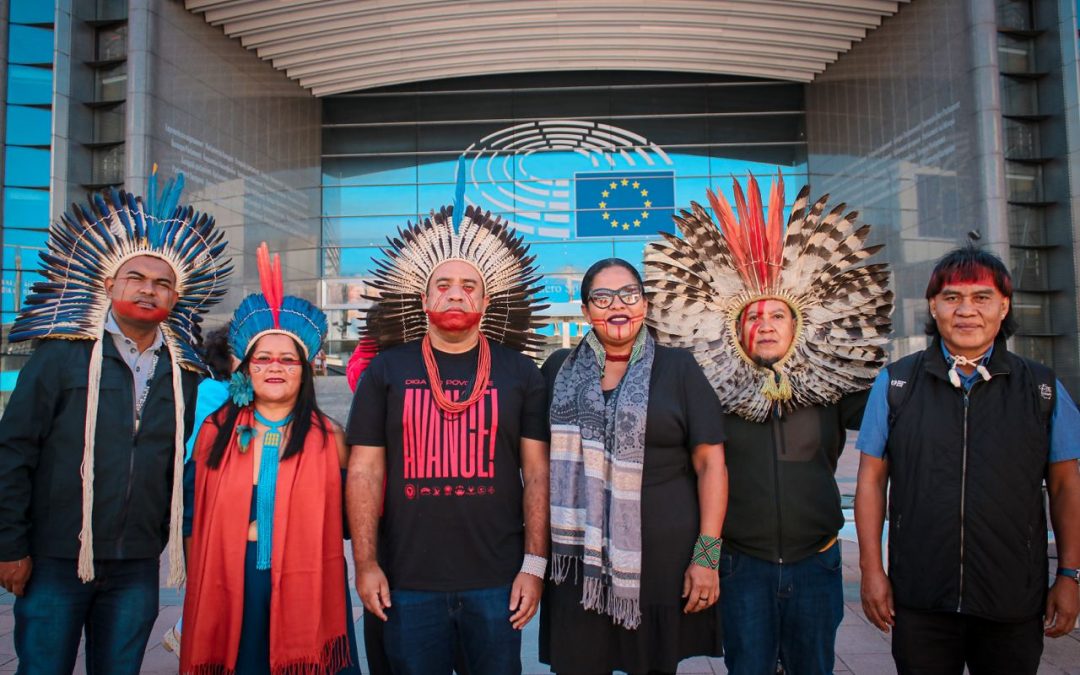
15/Sep/2022
The European Parliament voted yesterday, September 13th, on the draft law for Forest and ecosystem-risk commodities regulation (FERC). Among the results of the debate, the inclusion of respect for international agreements and treaties on the rights of indigenous peoples stands out, as APIB had been defending since the beginning of the proposal of this legislation. However, another of APIB’s main demands, which was the protection of all ecosystems, regardless of the definition of forest cover, was not included.
The FERC law, also known as the deforestation-free products law, will include measures that oblige companies producing commodities to respect international human rights legislation, which includes guaranteeing the rights of Indigenous Peoples. The Members of the European Parliament (MEPs), meeting yesterday (13) in Strasbourg, France, voted on the draft law and reviewed the suggested changes. Among the proposals accepted by the MEPs, there is the prerequisite that Indigenous Peoples have guaranteed access to free, prior and informed consultation on the production of commodities, as advocated by Convention No. 169 of the International Labor Organization (ILO). No product may be imported into the European Union without the responsible company obtaining the consent of the affected Indigenous Peoples to install a commodity production activity close to their lands.
Another of the accepted proposals was the revision of the law annually (every year), instead of every two years as was initially foreseen. MEPs did not give in to pressure from business lobbies and leather was included in the group of commodities regulated by the regulation for deforestation-free products. This implies a major victory, as leather is one of the main products potentially responsible for deforestation imported by the European Union. In addition to all commodities considered by the first law proposal -beef, palm oil, soy, wood, coffee and derivatives (such as chocolate and furniture)- the regulation voted today also considers the traceability of deforestation in the pork, sheep, goat and poultry meat, as well as corn, rubber and paper products.
The important role played by financiers of commodity production chains, was also considered. MEPs included regulation for European banks and investors to not finance deforestation and human rights violations.
The European Parliament is aware that the creation of a law for deforestation-free products in European Union countries will not end deforestation. Commodities with a forestry risk that can be sold in markets other than the European one. Then, the European Parliament proposes a cooperation program between countries to apply measures to stop forest destruction. The MEPs proposed that the European Commission be responsible for drawing up maps that identify countries with high deforestation risks, in order to support international cooperation programs. Likewise, they insisted on the need for good governance within the affected countries by deforestation, as well as the protection of the rights of Indigenous Peoples, traditional populations and other people who depend on nature.
Parliament requested assistance so that small producers can comply with the rules established by the FERC law, among which they highlight, for example, the need for geolocation traceability of products. It is fair and necessary to build partnership and cooperation programs to help small producers make a transition to sustainable agricultural and livestock production.
In addition, the legislation will include access to independent and impartial justice bodies to oversee the impacts of deforestation caused by commodity production, but only on an administrative basis. Companies cannot be directly prosecuted by penal or criminal law through the mechanisms established by FERC. Furthermore, the Euro-parliamentarians rejected the request to include in the anti-deforestation law the need for compensation mechanisms for Indigenous Peoples affected by commodity production chains.
“What this law needs is to be stricter in the traceability of these products. Indigenous Peoples are not looking for compensation, we want measures to avoid the impacts and, in case of illegalities, criminal prosecution for companies and not only administrative penalisations”, explains Dinamam Tuxá, APIB coordinator.
Another of the most important demands that was left out was the protection of all ecosystemes – regardless of the FAO definition of forests applied in the FERC law. “In addition to what this law recognized, we would like a much more ambitious regulation, recognizing and protecting other ecosystems for the guarantee and protection of these territories also under threat from the advance of agribusiness”, says Tuxá. “We understand that the non-recognition of other ecosystems within this law will put even more pressure on deforestation outside the Amazon forests. This brings us concern because these are productive areas that are already in a lot of conflict and that, in many places in Brazil, agribusiness have drastically advanced over indigenous territories”. Protecting only some natural areas opens a gap for commodity production chains to be moved from one region to another without solving the deforestation problem. APIB insists on the need to review this point in the coming months of debate before final approval of the text.
The result of the vote was the last step in the elaboration of the text of the FERC law which was presented to the European Parliament in November 2021. However, the legislation can still undergo changes, as a result of negotiations between the European Parliament, the European Council and the European Commission. This process, known as “trilogs”, aims to conclude a final version of the legislation by the end of the year 2022, approximately. Only after the final approval by all member states of the European Parliament, the law can come into force.
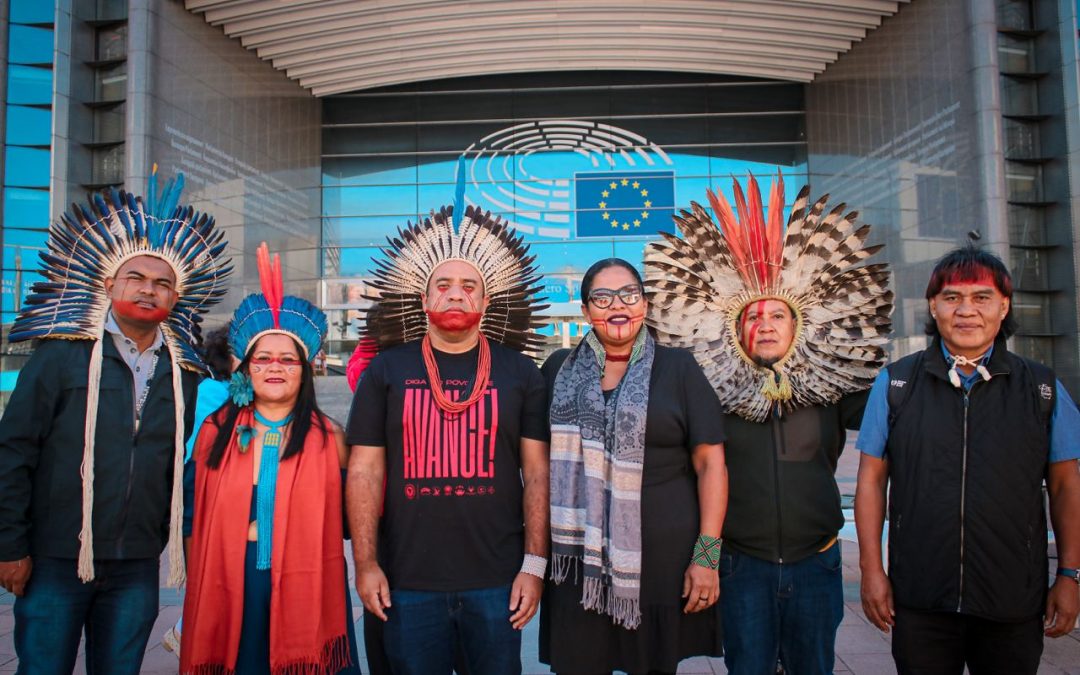
09/Sep/2022
On September 13th, the European Parliament will vote on the Proposal for a regulation on deforestation-free products (FERC law), also called the Deforestation-free products law. APIB has been following the construction of the legislation since 2020 as it has some gaps that prevent from guaranteeing the effective protection of Indigenous Peoples against the pressure of commodity production.
The Articulation of Indigenous Peoples of Brazil (Apib) promotes a campaign to guarantee the rights of indigenous peoples in the FERC regulation, which will be voted on by the European Parliament on September 13th. With the campaign named “We are all ecosystems” (Somos Todos Biomas), the organization also seeks to include all Brazilian ecosystems in the new legislation.
The FERC law provides sanctions to minimize the risk of deforestation and forest degradation associated with products placed on the EU market. However, the definition of forest defined by FAO and considered by the legislation is very reduced and excludes a good part of biomes and natural areas, which would be left out of protection. Increasing the traceability of production chains only in some biomes announces a threat of displacement and intensification of commodity production in the unsupervised natural areas, which historically have already suffered such pressure.
In the case of Brazil, if the law is applied according to the current proposal, the Amazon forest would be the only biome with the largest protected forest area (84%) from the threats of illegal deforestation for the production of commodities, followed by the Atlantic Forest, Mata Atlántica, (71%). By contrast, only a small part of Cerrado (26%), Caatinga (10%), Pantanal (24%) and Pampas (11%) biomes would be considered as forest to be protected by Deforestation-free products law, according to data from MapBiomas.
The Indigenous Peoples of Brazil, which are distributed throughout all the country and located in all biomes, are already suffering today the pressure of commodity production through: 1) illegal invasion and deforestation of their lands; 2) violence, threats and killings of indigenous leaders and activists who struggle for environmental and indigenous rights; 3) socio-environmental pressure through deforestation, fires and the intensification of large-scale agricultural activities around Indigenous Lands with the use of pesticides that pollute lands and rivers.
According to a crossing data study carried out by APIB with the location of Indigenous Lands in Brazil and the IPAM database about the land-use changes in a buffer of 25 km distance around: 29% of the territory around the Indigenous Lands is deforested, while within indigenous borders there is only 2% of deforestation. The data also shows that most of the deforested areas around Indigenous territories are lands under permanent cattle pastures (producing meat and leather) and soybean production, but also sugarcane, rice or cotton stand out among other commodities.
As a result of the growing risk of environmental degradation caused by some productive sectors, the proposal for a regulation on deforestation-free products aims to minimize consumption of products coming from supply chains associated with deforestation or forest degradation, and increase EU demand for and trade in legal and ‘deforestation free’ commodities and products. This, in turn, is expected to reduce GHG emissions and global biodiversity loss.
Nevertheless, all biomes have the same importance in achieving an environmental balance and APIB requests, first of all, that all natural areas should be protected by this legislation. We also demand respect for international treaties and agreements that protect human rights and indigenous rights, in particular, to provide a greater guarantee for the protection of the Indigenous Peoples of Brazil. In this regard, National legislations become insufficient when governments such as the current one of Jair Bolsonaro, with an openly anti-indigenist position, risk the lives of the guardians of the forests and biodiversity. Even with the pressure of globalization and commodities production, Indigenous Peoples struggle to continue living in an interrelationship of respect and sustainability with the forest. For this reason, APIB asks for the European Parliament to consider a more comprehensive deforestation-free products law that claims the protection of all types of vegetation and the world’s biodiversity, the survival of Indigenous Peoples and traditional populations, as well as the global climate balance to guarantee a good life for current and future generations.










